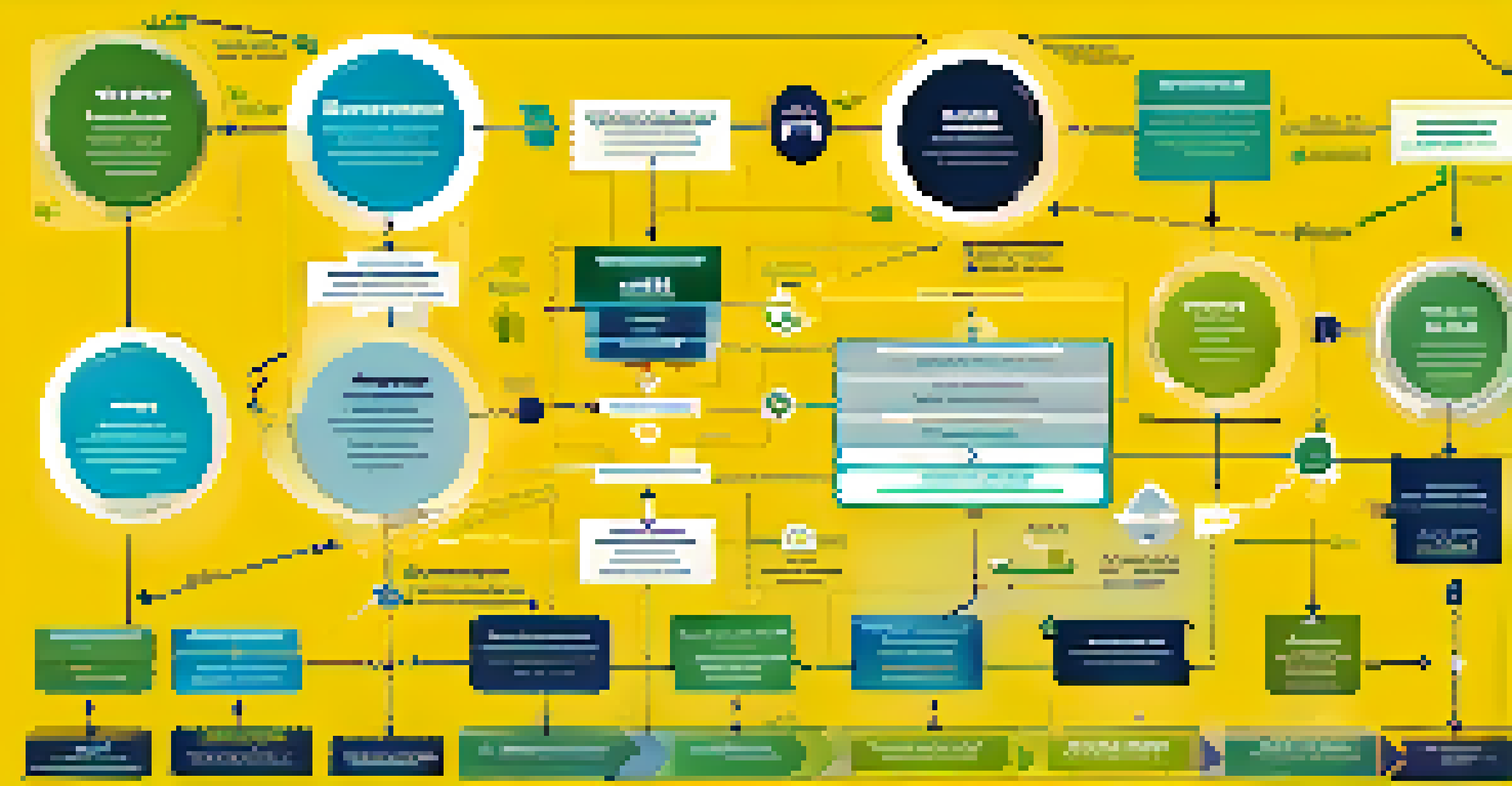How Blockchain Technology is Transforming Supply Chain Security

Understanding Blockchain Technology in Supply Chains
Blockchain technology is often described as a digital ledger where transactions are recorded across multiple computers. This decentralized nature ensures that no single entity has control over the entire system, making it resistant to tampering. In the context of supply chains, this means every step a product takes—from manufacturer to consumer—can be transparently tracked and verified.
Blockchain technology is not just a trend; it’s a transformative force that can redefine transparency and trust in supply chains.
For instance, consider a company that sources coffee beans from various farmers. With blockchain, every transaction, shipment, and quality check can be recorded on the blockchain. This traceability not only assures consumers of the product's authenticity but also helps the company identify and resolve issues in the supply chain more swiftly.
Ultimately, blockchain serves as a crucial backbone for supply chains by providing a clear, immutable record of all interactions. This foundational understanding sets the stage for exploring its specific impacts on supply chain security.
Enhancing Transparency in Supply Chains
One of the most significant advantages of blockchain in supply chains is enhanced transparency. Each participant in the supply chain has access to the same information, which minimizes misunderstandings and disputes. For example, if a shipment is delayed, everyone involved can see the same record of events, leading to quicker resolution.

This transparency also fosters trust among all parties. When consumers can access the history of a product, including where and how it was made, they are more likely to feel confident in their purchases. It turns the supply chain into a more open ecosystem, where accountability is paramount.
Blockchain Boosts Supply Chain Transparency
Blockchain enhances transparency by allowing all participants to access the same information, fostering trust and accountability.
Moreover, this level of transparency can help in regulatory compliance. Companies can easily provide proof of sourcing practices or safety standards, simplifying audits and inspections.
Improving Traceability and Accountability
Traceability is crucial in supply chains, especially in industries like food and pharmaceuticals. If a product is found to be defective or unsafe, blockchain allows companies to trace it back through the entire supply chain quickly. This rapid response can prevent further issues and protect consumers.
The greatest value of a blockchain is that it makes it easy to verify and trace transactions, which is invaluable in supply chain management.
For example, if a batch of contaminated lettuce is identified, a blockchain system can pinpoint the exact farms and processing facilities involved. This level of detail allows for targeted recalls rather than broad, sweeping actions that can harm more businesses unnecessarily.
Additionally, accountability is reinforced as each transaction is timestamped and attributed to a specific party. This discourages negligence and encourages all participants to adhere to best practices, knowing that their actions are recorded.
Reducing Fraud and Counterfeiting
Fraud and counterfeiting are persistent challenges in many supply chains. Blockchain technology combats these issues by ensuring that every product is uniquely identifiable and traceable. When a product is created, its information is recorded on the blockchain, making it easy to verify its authenticity.
For instance, luxury brands often face issues with counterfeit goods. By implementing blockchain, they can provide consumers with a digital certificate of authenticity linked to the product. This not only protects the brand's reputation but also enhances consumer confidence.
Traceability Enhances Safety and Recall
The traceability offered by blockchain allows companies to quickly identify and address issues in their supply chains, ensuring consumer safety.
Furthermore, because blockchain records are immutable, once information is entered, it cannot be altered without the consensus of the network. This characteristic makes it incredibly difficult for fraudsters to manipulate data undetected.
Smart Contracts: Automating Compliance and Payment
Smart contracts are self-executing contracts with the terms of the agreement directly written into code. In supply chains, they can automate various processes, such as compliance checks and payments, based on specific conditions being met. This reduces the need for intermediaries and speeds up transactions.
For example, if a shipment arrives at its destination on time and meets quality standards, a smart contract can automatically trigger payment to the supplier. This not only streamlines operations but also enhances trust, as parties know that payments are contingent on agreed-upon conditions.
By using smart contracts, companies can minimize human error and manual processing, leading to increased efficiency in the supply chain. This automation also allows businesses to focus on strategic decisions rather than getting bogged down in administrative tasks.
Strengthening Security through Decentralization
Blockchain's decentralized nature significantly enhances security within supply chains. Unlike traditional systems, which rely on a central authority, blockchain distributes information across a network of computers. This makes it much harder for hackers to compromise the system, as they would need to manipulate every copy of the ledger simultaneously.
In practical terms, this means that sensitive information about shipments, suppliers, and transactions is less likely to be stolen or altered. For instance, if a company relies on a single database, a cyber attack could lead to catastrophic data breaches. However, with blockchain, even if one node is compromised, the rest of the network remains intact.
Smart Contracts Streamline Operations
Smart contracts automate compliance and payment processes, increasing efficiency and reducing the potential for human error in supply chains.
This level of security is particularly crucial as supply chains become more digital and interconnected. As businesses increasingly rely on technology, safeguarding data integrity and confidentiality becomes paramount.
Challenges and Future of Blockchain in Supply Chains
While the benefits of blockchain in supply chains are substantial, there are challenges to its widespread adoption. Integration with existing systems can be complex, and companies may face resistance from stakeholders accustomed to traditional methods. Additionally, the technology is still relatively new, and regulatory frameworks are not yet fully established.
However, as more companies pilot blockchain solutions and share successful case studies, the momentum for adoption is likely to grow. The potential for increased efficiency, security, and transparency is too significant to ignore, and industry leaders are beginning to recognize this.

Looking ahead, the future of blockchain in supply chains appears promising. As technology continues to evolve and mature, we can expect to see more innovative applications that further enhance supply chain security and operational efficiency.